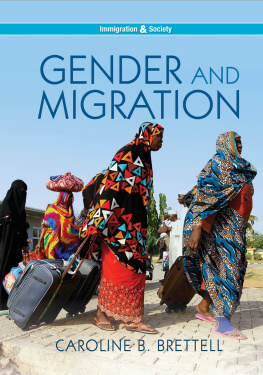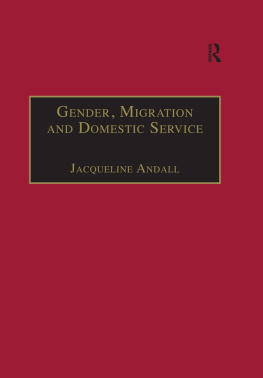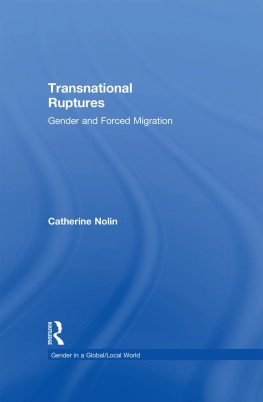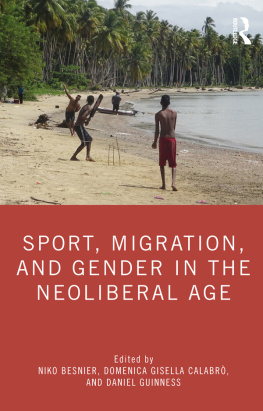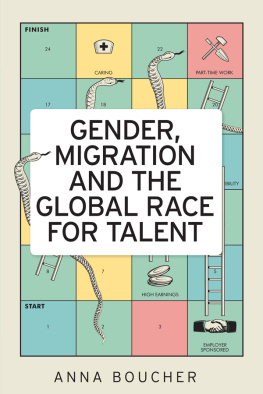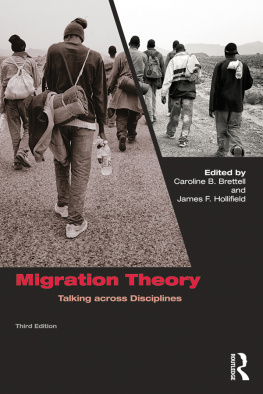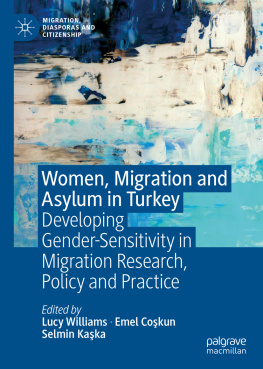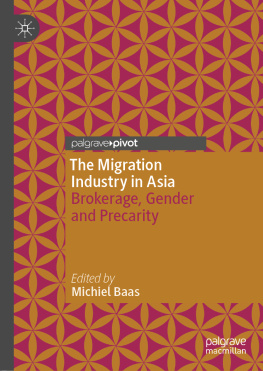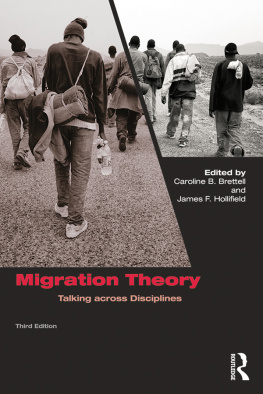Brettell Caroline B. - Gender and Migration
Here you can read online Brettell Caroline B. - Gender and Migration full text of the book (entire story) in english for free. Download pdf and epub, get meaning, cover and reviews about this ebook. year: 2016, genre: Home and family. Description of the work, (preface) as well as reviews are available. Best literature library LitArk.com created for fans of good reading and offers a wide selection of genres:
Romance novel
Science fiction
Adventure
Detective
Science
History
Home and family
Prose
Art
Politics
Computer
Non-fiction
Religion
Business
Children
Humor
Choose a favorite category and find really read worthwhile books. Enjoy immersion in the world of imagination, feel the emotions of the characters or learn something new for yourself, make an fascinating discovery.
- Book:Gender and Migration
- Author:
- Genre:
- Year:2016
- Rating:3 / 5
- Favourites:Add to favourites
- Your mark:
- 60
- 1
- 2
- 3
- 4
- 5
Gender and Migration: summary, description and annotation
We offer to read an annotation, description, summary or preface (depends on what the author of the book "Gender and Migration" wrote himself). If you haven't found the necessary information about the book — write in the comments, we will try to find it.
Gender and Migration — read online for free the complete book (whole text) full work
Below is the text of the book, divided by pages. System saving the place of the last page read, allows you to conveniently read the book "Gender and Migration" online for free, without having to search again every time where you left off. Put a bookmark, and you can go to the page where you finished reading at any time.
Font size:
Interval:
Bookmark:

Immigration & Society series
Carl L. Bankston III, Immigrant Networks and Social Capital
Stephanie A. Bohon & Meghan Conley, Immigration and Population
Caroline B. Brettell, Gender and Migration
Thomas Faist, Margit Fauser, & Eveline Reisenauer, Transnational Migration
Christian Joppke, Citizenship and Immigration
Grace Kao, Elizabeth Vaquera, & Kimberly Goyette, Education and Immigration
Nazli Kibria, Cara Bowman, & Megan OLeary, Race and Immigration
Peter Kivisto, Religion and Immigration
Cecilia Menjvar, Leisy J. Abrego, & Leah C. Schmalzbauer, Immigrant Families
Ronald L. Mize & Grace Pea Delgado, Latino Immigrants in the United States
Philip Q. Yang, Asian Immigration to the United States
Min Zhou & Carl L. Bankston III, The Rise of the New Second Generation
Caroline B. Brettell
polity
Copyright Caroline B. Brettell 2016
The right of Caroline B. Brettell to be identified as Author of this Work has been asserted in accordance with the UK Copyright, Designs and Patents Act 1988.
First published in 2016 by Polity Press
Polity Press
65 Bridge Street
Cambridge CB2 1UR, UK
Polity Press
350 Main Street
Malden, MA 02148, USA
All rights reserved. Except for the quotation of short passages for the purpose of criticism and review, no part of this publication may be reproduced, stored in a retrieval system, or transmitted, in any form or by any means, electronic, mechanical, photocopying, recording or otherwise, without the prior permission of the publisher.
ISBN-13: 978-0-7456-8792-6
A catalogue record for this book is available from the British Library.
Library of Congress Cataloging-in-Publication Data
Names: Brettell, Caroline, author.
Title: Gender and migration / Caroline B. Brettell.
Description: Cambridge, UK ; Malden, MA, USA : Polity Press, 2016. | Includes bibliographical references and index.
Identifiers: LCCN 2016003546 (print) | LCCN 2016005764 (ebook) | ISBN 9780745687889 (hardcover : alk. paper) | ISBN 0745687881 (hardcover : alk. paper) | ISBN 9780745687896 (pbk. : alk. paper) | ISBN 074568789X (pbk. : alk. paper) | ISBN 9780745687919 (mobi) | ISBN 9780745687926 (epub)
Subjects: LCSH: Women immigrants--United States. | United States--Emigration and immigration--Social aspects. | United States--Emigration and immigration--Government policy. | United States--Emigration and immigration--Economic aspects. | Immigrants--United States--Economic conditions. | Women immigrants--United States--Economic conditions. | Immigrant families--United States.
Classification: LCC JV6602 .B74 2016 (print) | LCC JV6602 (ebook) | DDC 304.8/730082-dc23
LC record available at http://lccn.loc.gov/2016003546
The publisher has used its best endeavours to ensure that the URLs for external websites referred to in this book are correct and active at the time of going to press. However, the publisher has no responsibility for the websites and can make no guarantee that a site will remain live or that the content is or will remain appropriate.
Every effort has been made to trace all copyright holders, but if any have been inadvertently overlooked the publisher will be pleased to include any necessary credits in any subsequent reprint or edition.
For further information on Polity, visit our website: politybooks.com
In 1972, between my first and second years of graduate school, I spent the summer in the field with Portuguese immigrants in Toronto, Canada. I found an apartment in the attic of a threestory house in the heart of Kensington Market, a neighborhood that had always been an immigrant receiving area. At the time, the Portuguese were the most recent residents. Two Portuguese families, one from the Azores and one from mainland Portugal, lived in the building. The man from the mainland told me his story of having worked in France for a while and then, hearing that life was better in Canada, he returned to Portugal and with his wife and child moved to Canada. Both he and his wife were working in Canada, although his wife had never migrated with him to France. And yet they talked about other Portuguese women who were migrating to France as they were to Canada. This is how I first became interested in Portuguese migration to France, a migration that I thought might permit more back and forth movement between the country of emigration and the country of immigration than for those in Canada. But as I talked to the two Portuguese women in the household I also realized that to date little was known about female migrants and an idea for a dissertation topic on Portuguese migrant women in France began to brew in my mind.
Louise Lamphere, one of my professors, had already sparked my interest in feminist anthropology, and in gender as a critical but under-examined category within anthropology more generally. At the time, she and her close colleague Michelle Rosaldo were beginning to formulate a framework for studying the lives of women in different cultural contexts, and two years later they published their path-breaking edited volume Woman, Culture and Society (Rosaldo and Lamphere 1974). It made sense to me to put the broader questions of feminist anthropology together with my interests in migrant populations. With funding from the Social Science Research Council and the Social and Humanities Research Council of Canada I went to Paris for a year (19741975), followed by six months of research in northern Portugal to launch a study of Portuguese migrant women and of the impact of male migration on women who remained behind. After completing my dissertation, I published two monographs, We Have Already Cried Many Tears: The Stories of Three Portuguese Migrant Women (1982; 1995), and Men Who Migrate, Women Who Wait: Population and History in a Portuguese Parish (1986). With a sociological colleague, Rita James Simon, I also coedited a book titled International Migration: The Female Experience (1986), which at the time was pioneering in drawing attention to women who were movers rather than stayers.
These were early works problematizing and theorizing the role of women in the migration process and the relationship between gender and migration. By the 1990s research in this area began to proliferate as migration itself became increasingly feminized and globalized. Growing numbers of women, single and married, were mobile for both shorter and longer distances. Southsouth migrations began to coexist with southnorth migrations. From the perspective of the second half of the second decade of the twenty-first century, a question that had not even been posed in 1972 is now well addressed and we know a good deal about migration as a gendered process that impacts both women and men in meaningful ways. Personally, I moved on to other questions about the migration process, but I have always kept my eyes on the anthropology of gender broadly speaking and on the research that has illuminated gender and migration. This book is a product of these sustained and continuing interests.
I dedicate this book to all the scholars, many of them women, who have brought the gendered dimensions of migration to the forefront in the period since I first explored the issue. The research of many of them is discussed and cited in what follows. But above all, I dedicate this book, with gratitude, to Louise Lamphere. Not only has she been an inspiring mentor and leader, but also a very good and lifelong friend.
Font size:
Interval:
Bookmark:
Similar books «Gender and Migration»
Look at similar books to Gender and Migration. We have selected literature similar in name and meaning in the hope of providing readers with more options to find new, interesting, not yet read works.
Discussion, reviews of the book Gender and Migration and just readers' own opinions. Leave your comments, write what you think about the work, its meaning or the main characters. Specify what exactly you liked and what you didn't like, and why you think so.

